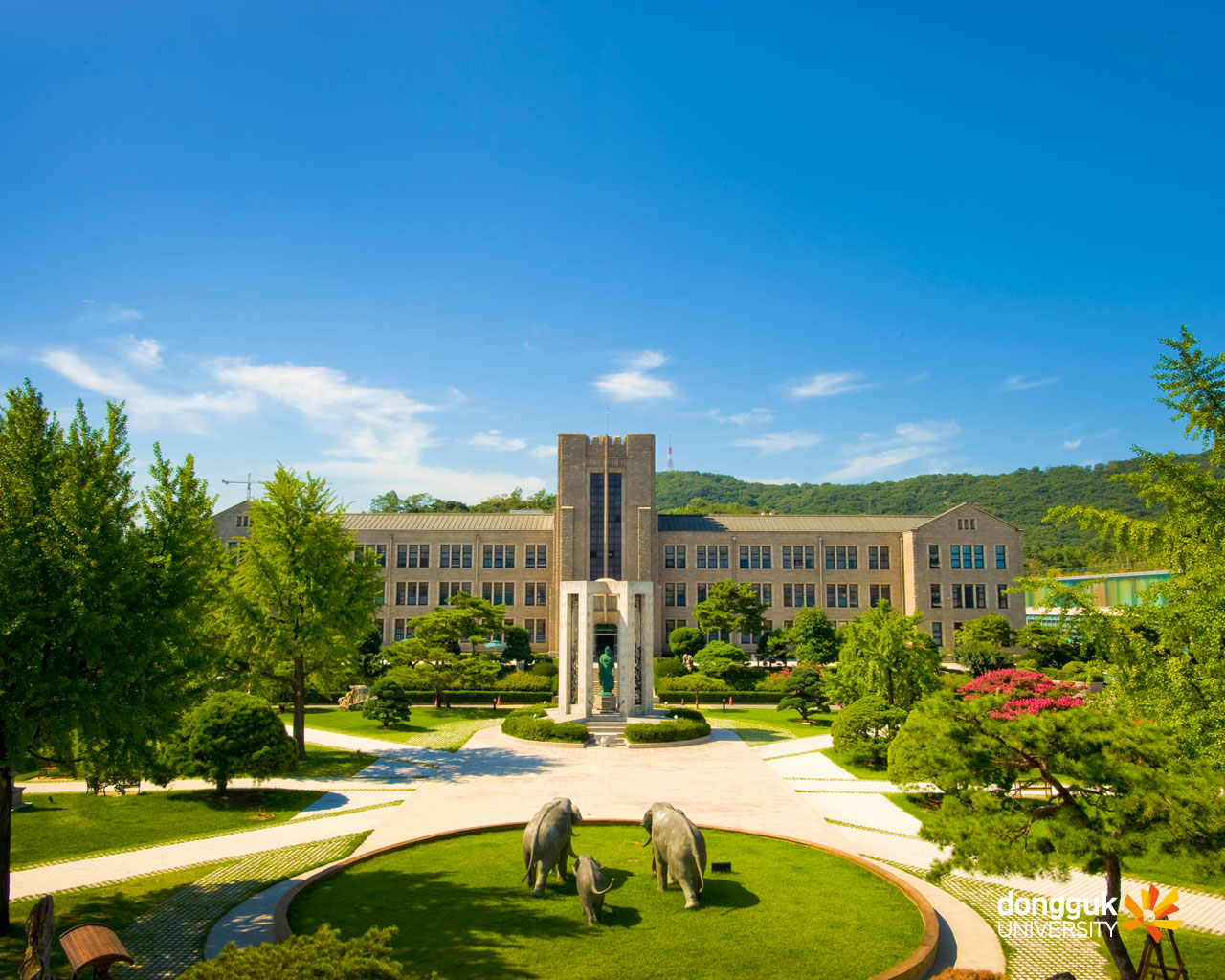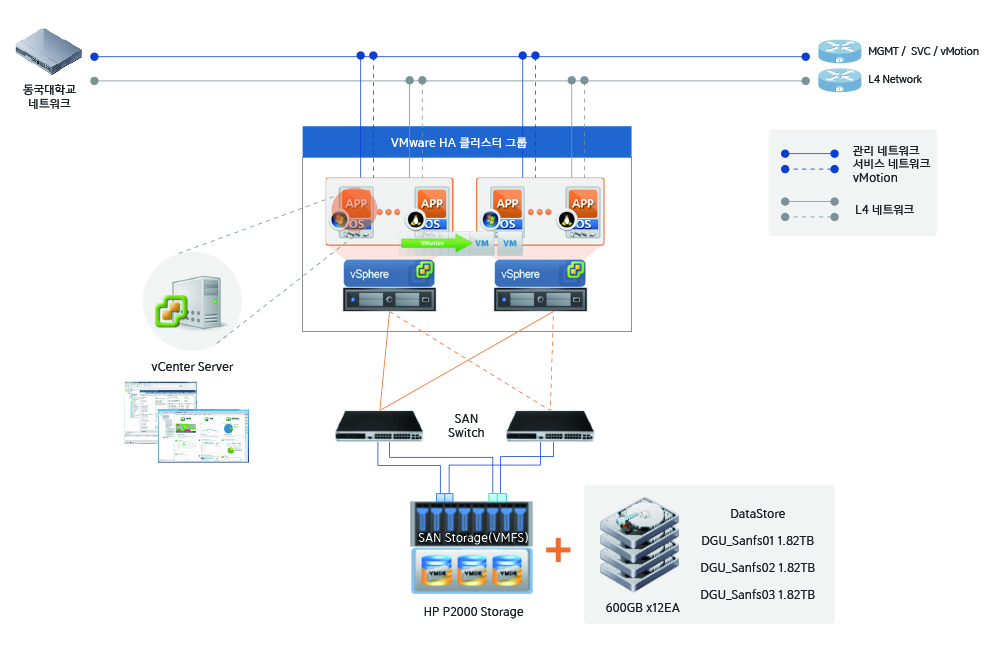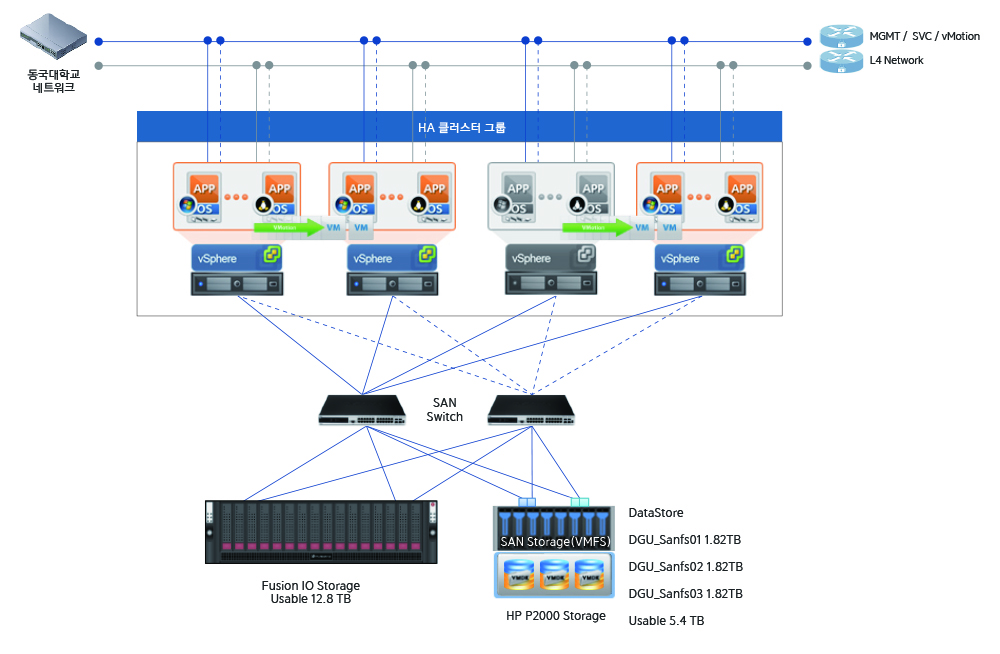동국대학교, 시스코 UCS 서버 및 VM웨어 가상화 솔루션 도입
[컴퓨터월드] 동국대학교가 최근 서버 가상화를 도입해 성능과 안정성까지 향상시킨 것으로 알려지면서 국내 대학들과 관련 업계로부터 많은 주목을 받고 있다. 지난해 ‘윈도우 서버 2003’의 기술지원이 종료되면서 ‘윈도우 서버 2012’로 시스템 이전을 추진한 동국대학교는 물리 서버 방식이 아닌 서버 가상화를 선택하면서 서버 대수를 줄이고, 관리 부담까지 낮추는 효과를 얻었기 때문이다. 이에 동국대학교는 학내 모든 시스템의 가상화를 목표로 사업을 진행하고 있다. 동국대학교가 추진한 서버 가상화는 어떤 솔루션이 도입됐으며, 또 어떻게 진행됐는지 알아본다.

서버 2대로 기존 시스템 대체, 이중화 구성까지 ‘OK’
지난해 마이크로소프트의 서버용 운영체제 ‘윈도우 서버 2003’의 기술지원이 공식적으로 종료되면서 기업뿐만 아니라 대학에서도 ‘윈도우 서버 2012’ 등 새 운영체제로 시스템을 이전하기 위한 움직임들이 시작됐다. 기술지원이 종료되면 더 이상 보안 패치나 오류사항 업데이트 등의 지원을 받을 수 없기 때문이다.
‘윈도우 서버 2003’을 사용하던 동국대학교 역시 새 시스템으로의 이전을 추진하면서 기존 서버를 추가하는 것 대신 서버 가상화를 도입하는 방안을 택했다. 서버 가상화를 이용하면 기존보다 더 적은 수의 서버로도 시스템 운영이 가능할뿐더러, 성능 향상도 기대할 수 있기 때문이었다.
이에 동국대학교는 기존 레거시 장비들을 서버 가상화로 전환한다는 계획을 세우고, 굿모닝아이텍을 주사업자로 선정해 사업을 진행했다. 우선적으로 서버 가상화를 위한 인프라를 구축하고자 동국대학교는 지난해 시스코 UCS 서버 2대를 도입해 ‘윈도우 서버 2012’로의 마이그레이션을 진행했으며, VM웨어의 가상화 솔루션 ‘vSphere’를 통해 서버 가상화 환경을 구축했다.
동국대학교는 서버 가상화 환경을 구축하면서 가상환경을 HA(High-Availability) 클러스터로 구성해 이중화시켰다. 이는 특정 구간에 장애가 발생했을 시에도 전체 시스템이 중단되지 않고 운영될 수 있어 시스템 안정성을 크게 높여준다.
동국대학교 정보처 문상국 정보운영팀장은 “가상화를 위한 여러 솔루션들이 있지만, 시스코의 UCS 서버와 VM웨어의 가상화 솔루션이 가장 괜찮다고 판단했다. VM웨어의 솔루션은 가장 안정적인 서버 가상화 솔루션으로 알려져 있으며, 시스코의 UCS 서버는 서버 기능뿐만 아니라 네트워크 기술이 잘 접목돼 있어 구축하고자 하는 시스템에 가장 적합한 제품”이라고 솔루션 도입 배경을 설명했다.

| 시스코 ‘UCS(Unified Computing System)’ 서버
 가상화·클라우드 환경이 확산되면서 네트워크가 서버, 스토리지가 통합되는 경향을 보이고 있다. 이는 하나의 서버에 여러 개의 네트워크 카드가 필요하다는 것을 의미하며, 시스템의 구조가 복잡해지면서 서버 효율성 저하, 관리 복잡성 증대, 발열 및 확장성 문제 등의 문제점을 노출시킨다. 시스코의 UCS는 시스코가 자사만의 네트워크 기술이 적용된 통합 네트워크 카드를 장착해 이러한 문제를 해결한 서버다. 이를 통해 네트워크 대역폭의 효율성을 높이고, 케이블의 단순화 및 관리 자동화는 물론, 공간 활용 효율성도 크게 높일 수 있도록 했다. 또한 통합된 네트워크 카드를 이용해 스위치에 대한 추가 부담 없이 서버를 확장할 수 있다. 또한, 시스코 UCS는 멀티 시스템 운영 시 기존 환경 대비 10% 이상 전력 절감 효과도 제공하는 것으로 나타나, 가상화 환경에서 대규모 서버를 도입하거나 클라우드 서비스를 위한 데이터센터 구축 등에 많이 활용되고 있다. |
줄어든 서버 수만큼 관리 부담 덜어
동국대학교가 서버 가상화를 구현하기 이전의 물리 서버에서는 서버 당 최대 1천 명까지 접속이 가능했지만, 실제로 그렇게 시스템이 활용되지 못했다. 직원들이 출근하는 아침시간대에는 동시접속으로 인해 부하가 걸려 시스템이 느려지거나 심지어는 다운되기도 했었다. 이럴 경우 문제가 발생한 시스템이 어디인지 찾아내는 것도 쉽지 않았다.
그러나 서버 가상화를 도입하고부터는 더 이상 이런 문제로 걱정할 필요가 없게 됐다. 서버 당 최대 2천 명까지의 동시 접속이 가능해졌으며, 가상 서버가 이중화돼있기 때문에 특정 구간에서 문제가 발생하더라도 시스템은 정상적으로 작동하기 때문이다. 특히, 단 2대의 서버만으로도 10대 이상의 물리 서버 역할을 대체하게 되면서 관리 부담 역시 크게 줄어들었다.
‘윈도우 서버 2012’로의 마이그레이션 이후 동국대학교는 학내 시스템의 가상화를 구현하는데 초점을 맞추고 지난해 12월부터 부터 ‘그룹웨어 고도화 사업’을 시행해오고 있다. 올해 5월 본격 서비스 시행을 앞두고 막바지 사업이 한창이지만, 사업 결과에 대한 전망은 밝은 편이다. 이미 운영체제 마이그레이션을 통해 서버 가상화의 효과를 톡톡히 경험했기 때문이다.
동국대학교는 서버 가상화를 통해 시스코 UCS 서버 2대로 그룹웨어 서비스를 구현했으며, 마찬가지로 이중화 구성까지 마쳤다. 이를 서울캠퍼스 1천여 명, 경주캠퍼스 8백여 명, 의료원 3천여 명과 부속 유치원 및 중·고교 3백여 명, 도합 5천여 명의 임직원이 이용하게 된다. 이전까지 물리 서버 8대로 운영되던 시스템이 서버 가상화를 통해 단 2대만으로도 운영되는 것이다.
이를 위해 소요된 사업비용은 약 5억 원. 얼핏 보면 비싸 보일 수도 있지만, 운영효과까지 생각하면 상당히 저렴하게 구축했다는 평가다.
문상국 정보운영팀장은 “관리 편의성 및 시스템 호환성을 고려해 지난번과 마찬가지로 시스코 UCS 서버를 도입했다. 실제로 솔루션을 도입해 운영해본 결과 관리 포인트가 줄어들었고, 이중화 구성으로 시스템 안정성을 높일 수 있어 만족스럽다. 서버가 줄어든 만큼 공간이 확보된 것은 덤이다”라고 설명했다.

전교 가상화 환경 구축 목표…SW중심대학 선정 및 개인정보 보호 대응
지난해부터 올해까지 이어진 서버 가상화 사업을 통해 동국대학교는 시스템 관리 부담이 줄어든 것과 더불어 이중화 구성을 통한 시스템 안정성까지 확보할 수 있게 됐다. 이를 바탕으로 아직까지 남아있는 물리 서버들을 모두 가상화 환경으로 전환하겠다는 계획이다. 이미 내년부터 차세대 사업 계획이 예정돼있으며, 예산 배정을 위한 준비가 한창이다.
또한, 동국대학교는 서버 가상화뿐만 아니라 사용자들을 위한 전교 데스크톱 가상화(VDI) 환경을 구축하겠다는 계획을 갖고 있다. 이는 동국대학교가 소프트웨어(SW)중심대학으로 선정된 것과 더불어 개인정보 보호라는 목적을 갖고 있다.
정부가 중점적으로 추구하고 있는 SW중심대학 사업은 대학 등 교육기관이 산업계에서 요구하는 전문 인력을 충분히 공급하지 못하는 ‘공급절벽’을 해소하고자, 대학 SW교육을 현장 수요기반으로 혁신하기 위한 사업이다. ▲산업현장의 요구 반영한 교과과정 개편 ▲타 전공지식과 SW소양 겸비한 융합인재 양성 ▲인재선발·교원평가 개선 및 SW가치 확산 ▲SW중심대학 교육 확산을 위한 협력 강화 등을 추진할 수 있도록 지원한다.
이에 동국대학교는 SW중심대학 선정에 맞춰 기존 SW학과의 정원을 확대하고, SW융합연계전공을 운영하는 등의 준비를 하고 있다. 그러나 3천여 명에 달하는 학생들이 이용할 PC 환경을 제공하기에는 예산과 공간 문제 등에 부딪힐 수밖에 없다.
이에 동국대학교는 VDI 환경을 구축함으로써 학생들이 언제 어디서나 로그인만 하면 자기 환경의 PC로 이용할 수 있도록 할 예정이다. 학생 수만큼 PC가 설치되지 않더라도 VM을 이용해 사용자 환경을 생성하고 폐기할 수 있기 때문에 관리적인 측면에서도 유리하다.
동국대학교가 전교 VDI 환경을 추진하겠다는 계획을 세운 것은 관리적인 측면에서도 이점이 있지만, 최근 강화되고 있는 개인정보 보호 이슈에도 대응하기 위한 목적도 있다. 현재는 많은 개인정보가 사용자 PC에 저장돼 있으며, 아무리 조심한다 해도 사용자의 실수로 개인정보가 유출될 수 있다. 이를 미연에 방지하고자 VDI 환경을 구축, 사용자 PC에 개인정보를 비롯한 중요정보를 보관하지 않도록 하겠다는 입장이다.
이를 이용하면 입학사정관 등 계약직 인원들이 퇴사하면서 개인정보를 외부로 임의 반출하는 것을 막을 수 있으며, 외부 시간강사 등이 별도의 PC를 휴대하지 않더라도 학내 어디에서든 강의자료와 학사평가자료 등을 관리할 수 있어 상대적인 약자에 대한 배려도 가능하다.
| “서버 가상화 이점 많아…타 대학에도 적극 권장”
 사업 결과에 대해 평가한다면 시스코 UCS 서버와 VM웨어 가상화 솔루션을 선택한 이유는 또한, VM웨어의 가상화 솔루션은 서버 가상화를 위한 안정적인 솔루션이다. HA 클러스터 구성을 통해 시스템 전체를 이중화시킬 수 있어, 특정 구간에서의 시스템 다운이 발생하더라도 전체 시스템 운영에 지장을 주지 않는다. 이러한 이점들 때문에 시스코 UCS 서버와 VM웨어 가상화 솔루션이 서버 가상화를 위한 최적의 솔루션이라고 판단하고 도입했다. 향후 계획은 |
[Case Study] Improving Maintenance Burden and Reliability with Server Virtualization
[ComputerWorld] Dongkuk University has been gaining attention for its implementation of server virtualization which enhanced the university’s reliability and performance of their IT systems. Dongkuk University’s switch from ‘Window Server 2003’ to ‘Window Server 2012’ server virtualization last year has piqued the interests of other universities and industry leaders. By endorsing server virtualization over physical methods, Dongkuk University greatly reduced their costs. Dongkuk University has since continued their efforts, and is now aiming to switch all systems within campus to server virtualization. This article explores the virtualization options chosen by Dongkuk University, and how the system was operated.

Perfectly replaced and duplicated the physical counterpart with only two servers
Stemming from Microsoft’s closure of ‘Window Server 2003’, administrative procedures in corporations and different institutions had to migrate to a different administrative product. Slow movements occurred to transfer existing data to ‘Window Server 2012’. ‘Window Server 2003’ became obsolete, and technological support and patching subsequently stopped
Dongkuk University, a previous ‘Windows Server 2003’ user, took a slightly different route while migrating its data to the new program. As well as maintaining the previous server, Dongkuk University incorporated server virtualization methods. This was stemmed from the reasoning that server virtualization will decrease the amount of servers while enhancing its performance.
Therefore, Dongkuk University came up with a plan to transfer existing data to server virtualization, and chose Goodmorning Information Technology Co., Ltd. as their partner to proceed its plans. Above anything else, Dongkuk University’s first move last year(2015) was to incorporate Cisco’s UCS servers. The two Cisco UCS Servers was the beginning of the migration from ‘Window Server 2012’. As well, the integration of VMWare’s virtual solution ‘vSphere’ provided the foundation of server virtualization.
While preparing its virtual server, Dongkuk University configured its virtual environment as a HA(High Availability) cluster and duplicated it. In case of an error, this allows the entirety of the program to remain undisrupted. HA clustering and duplication enables efficiency in work and reliability.
Dongkuk University’s information team leader Mr. Sangkuk Moon explained, “There are many solutions for virtualization, but we have decided that Cisco’s UCS Server and VMWare’s virtualization solution was the most suitable in the market. VMWare’s stable server virtualization is well known in the industry and Cisco’s UCS Server’s function’s networking functions are highly sought after and appropriate for variety of circumstances”.

 With the expansion of virtualization/cloud environments, there is a tendency of storage to be merged together. This means that numerous network cards are required for one server, which degrades system efficiency and causes maintenance issues, overheating, and expansion problems due to the complexity of structure. To combat these issues, Cisco added an integrated network card that they developed into the Cisco UCS. By doing so, they drastically improved the network’s bandwidth as well as simplifying the cables, maintenance, and usage of space. In addition, integrated network cards allow for a hassle-free server expansion. Compared to previous virtualization environment, Cisco’s UCS boasts superior features with a 30% increase in application abilities, 40% increase in storage IO return, and a 20% decrease in system CPU burden. In addition, operating Cisco’s UCS multi-system will allow a 10% increase in power savings compared to previous environments. This benefit attracts large scale servers and data services. |
Maintenance fees lessen as the number of servers go down
Prior to server virtualization, Dongkuk University’s physical servers allowed up to a thousand simultaneous users. However, in reality, the program could not provide for its projected capacity. During peak hours, the system would go through lag and buffering, sometimes even a full shut-down. In these cases, it would be difficult to identify where and how the problem occurred.
After the integration of server virtualization, there was no need to worry about these issues. The server was able to house up to 2000 people simultaneously, and a duplication of the server allowed sustained the server even through cases of system failure. Moreover, more than ten physical servers were replaced by two virtual servers, which brought down the need for maintenance.
After the migration from ‘Windows Server 2012’, Dongkuk University has put its focus on the implementation of the school’s system virtualization. Since December 2015, Dongkuk University has proceeded with its ‘Groupware Advancement Proposition’, and is busy with their service enforcement since May 2016. The future looks bright for their service enforcement, as they already experienced a great deal of benefits from its server virtualization.
Dongkuk University has incorporated two UCS Servers through server virtualization, and finished its duplication. This program will be used by 1000 Seoul Campus students, 800 Kyungju Campus students, 3000 medical professionals, and 300 preschoolers to middle·high school. A total of approximately 5000 executives will use this program. It is impressive how two virtual servers outperformed eight physical servers.
The funds needed to set up server virtualization was around KRW 500 Million Won(460 thousand USD approximately). This figure may seem fairly pricey, but considering the administrative benefits, the figure seems quite reasonable.
Information administrative team leader Sangkuk Moon states, “Considering the easy maintenance and system compatibility, we have chosen Cisco UCS Server as per the previous time. What we have noticed from running the program, is the reduced maintenance points and improved stability from the duplication. It is also a positive bonus that we were able to secure extra space from the decreased servers”.

Goal to implement server virtualization all around campus…Protecting privacy and becoming a recognized SW focused university
From last year to this year, Dongkuk University was able to secure decreased maintenance burden and system stability from duplication. The university plans to switch its physical servers to virtual servers. Plans are already made to bring in more server virtualization, and budget allocations are being made for this plan.
Dongkuk University has plans to bring in VDI(Virtual Desktop Infrastructure) for the whole campus. As well as being a software focused business, the university plans to bring stronger privacy protection measures.
SW(software) focused universities are the ones aligned to the government’s pursuit of getting rid of the scarce power supply, which incurs form the lack of trained professionals. The government hopes to make SW universities as a demand based site. ▲Restructuring the learning curriculum reflecting the needs of major industries ▲Promoting the growth of different majors and SW university elites ▲Choosing talented students/teacher evaluation and improving the worth of SW ▲Expanding SW focused universities from various funding and cooperation
Aligning themselves with the SW focused university selection process; Dongkuk University expanded SW department's student population, and getting ready to administer SW’s major fused connection. However, there are difficulties within the allocated budget and space to bring in a PC environment that will be utilized by 3000 students.
To combat this problem, Dongkuk University has plans to create a VDI environment that only requires a log in procedure. This is beneficial in the fact that there is no need to match the number of PC to the number of students. It can also dispose or set up user environments easily, which promotes easy maintenance.
Along with the maintenance advantages, Dongkuk University had privacy protections on its mind. Currently, the majority of private information is saved on to the user’s PC, and even with precaution there may be a privacy leak. To avoid this, VDI environment was implemented. This deletes private information caches and shows Dongkuk University's strive to keep private matters private.
This can also work in a way that deters contract workers and admissions workers from leaking private company information to external sources, and brings convenience to workers as they do not have to carry around their own devices to hold teaching resources and information.
| “Many benefits of server virtualizations… recommended to other universities”
 To evaluate the results: Reason why Cisco UCS Server and VMWare Virtualization Solution was chosen: Also, VMWare is a stable solution for server virtualization. HA cluster configuration has the scope to duplicate the whole system, which does not affect the system’s administration. From these positive aspects, Dongkuk University decided that Cisco UCS Server and VMWare Virtualization were the most suited for server virtualization.” Future Plans: |






